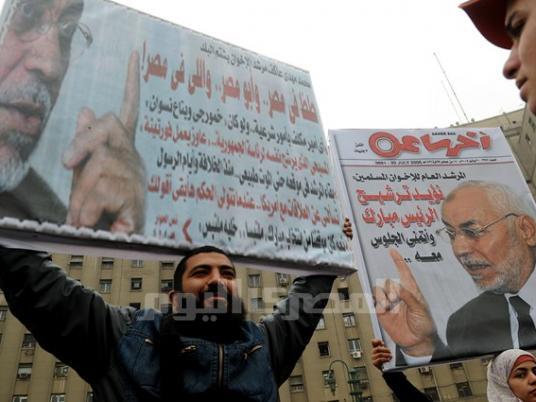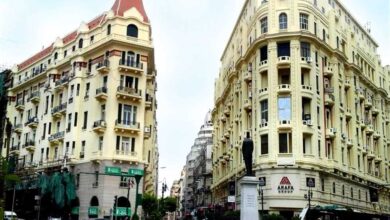
Muslim Brotherhood members prevented hundreds of protesters from reaching the Parliament building in downtown Cairo on Tuesday as part of the so-called “Tuesday of Determination” demonstrations to demand an accelerated transfer of power to civilians.*
Protesters turned their chants against the Muslim Brotherhood after Brotherhood supporters formed a human chain. Despite minor injuries, the standoff ended peacefully after Parliament's session ended and protesters returned to Tahrir Square and Maspero.
The Health Ministry said in a statement that the clashes resulted in the injury of 43 people. In the statement, Deputy Health Minister Adel Adawi said that medical care was provided to 23 cases on the spot, while 20 others were transferred to the hospital and are in stable condition, with most suffering from fractures and bruises.
At least seven marches had headed to the Parliament building on the "Tuesday of Determination," demanding the transfer of power from the ruling Supreme Council of the Armed Forces to civilians faster than the current timetable proposes. Hundreds of students from Cairo and Ain Shams Universities marched to Tahrir Square to participate in the demonstrations.
But the chants of “Down with military rule” quickly turned to “Down with the Muslim Brotherhood” when protesters encountered members of the group who were blocking their path. The group’s Freedom and Justice Party controls about 43 percent of the People’s Assembly.
The march arriving from Cairo University was the first to encounter the Brotherhood. Protesters headed to Parliament with demands for early presidential elections, social justice and the prosecution of figures from the fallen regime.
“This time we are delivering our message to Parliament, we refuse to let the military have any influence on the drafting of the constitution,” said Mohamed Assy, a medical student and one of the protest’s organizers.
“These are the people that we elected to represent us, so we are delivering our demands to them,” he added, minutes before the protest was halted by FJP representatives to whom the protest, in part, was directed.
Central Security Forces cleared the way for them to pass, but as soon as the protesters approached Parliament, Freedom and Justice Party members formed a human chain, locking their hands together to prevent the protest from proceeding.
A march from Ain Shams University reached the Parliament building after security opened a path down Magles al-Shaab Street. The protest was joined by Eng Mamdouh Hamza on its way from Tahrir Square. Hamza demanded that presidential nominations be accepted by or on 11 February.
All the marches congregated at Magles al-Shaab after the Muslim Brotherhood youth withdrew, ending their blockade of the street.
Members of the Muslim Brotherhood said they had no instructions from leadership to take to the street, but they saw on television that “some political movements are organizing protests outside Parliament.”
“The transformation of the Muslim Brotherhood to a new Central Security Force is a real shame, this is a historic mistake that tarnishes the whole history of the Muslim Brotherhood,” said Hamed al-Defrawy, a former leading Muslim Brotherhood member who left the group in 2010, as he observed the standoff between the Brotherhood and protesters.
Although most of the FJP members refused to talk to reporters, one member of the party explained that they had formed the wall in response to threats online that demonstrators would not let MPs leave the Parliament building.
“We can’t guarantee that there aren’t thugs on our side, and we can’t guarantee that there aren’t thugs on the other side; that’s why we want to separate both sides to avoid confrontations,” explained Alaa Gouda, a FJP member.
People in the crowd, however, blamed the Brotherhood for provoking violence.
Some raised their shoes at the Brothers, a few threw rocks, others tried to break the wall by force, and still others formed a shield between the Brotherhood and their furious colleagues, chanting “peaceful” in an attempt to prevent clashes.
The protesters were joined by other marches arriving from Maspero, the general prosecutor’s office and Saad Zaghloul shrine with the same demands. Despite the increasing numbers, the Brotherhood held its formation.
Ziad al-Eleimy, a newly elected member of parliament from the Revolution Continues Coalition, left Parliament and joined protesters outside in objection to the Brotherhood blockage.
The crowd accused the Brotherhood of selling out the revolution for the sake of a deal with the military rulers.
“The Brotherhood and the military are two sides that you cannot trust,” screamed the crowd.
“The Brotherhood had certain demands, which they have now achieved. Now they don’t want to fight for the other demands of the revolution,” said Hassan Aboul Enein, who arrived at Parliament with the march from Maspero.
Since the FJP acquired a majority in Parliament, revolutionaries have begun to suspect the existence of a secret deal between FJP and the ruling military council, one which would transfer power to the Brotherhood while exempting the military from prosecution.
Tuesday's confrontation represents a new escalation in tension that started earlier this week between revolutionary forces and the Muslim Brotherhood. The gap between the two groups widened when the Freedom and Justice Party announced that it would celebrate the revolution’s anniversary in the square; revolutionary forces declared 25 January a day of protest to push for the revolution’s demands and mourn its martyrs.
The FJP’s stage in Tahrir Square was attacked with rocks and bottles by protesters last Friday who objected to Brotherhood celebrations on the revolution’s anniversary.
*Correction: This article originally stated that members of the security forces also took part in blocking the protest. They did not.




